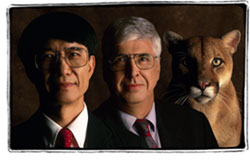|
 
Dr. Paul Chu
UH Professor Continues to Lead the Way
On one side you have the students, colleagues, and, yes, even fans, who see
a man whose accomplishments have the potential to change every aspect of our day-to-day
lives. They see a man who has literally written the book on superconductivity.
They see a man who is living proof of what the human mind can accomplish if just
nurtured and focused. On the other side you have “Paul” C. W. Chu, the
humble professor and researcher that takes it all with a grain of salt, all the
while looking to squeeze in a little extra time to spend in his garden.
Paul Chu, since joining UH in 1979, has garnered nearly every honor his field
has to offer. So many awards that it is simply pointless to run down the list
but just for the record here are some: the 1994 Bernd Matthias Prize for his work
in high temperature superconductivity; in 1990 US News and World Report
voted him the Best Researcher in the US; and in 1990 he was awarded the Texas
Instruments Founders Award; and in 1988 he won the National Medal of Science.
Chu has honorary professorships and doctorates from more than a dozen universities
around the world, and belongs to even more national and international societies
and organizations, including the National Academy of Sciences and the American
Academy of Arts and Sciences. With more than 400 articles published, he has even
written the encyclopedia entries for Funk and Wagnall on lasers and superconductivity.
None of this, however, seems to phase the ultra modest Chu.
“It’s all very subjective,” commented Chu when asked about being
voted America’s best researcher. “They just asked the right voters.”
Subjective, maybe, but it is easy to see why Chu is one of the star faculty being
showcased in UH’s new marketing campaign, launched this February.
Studying first in Cheng-Kung University in Taiwan, then Fordham University
in New York and then at the University of California in San Diego, Chu arrived
in Houston in 1979 where he quickly went about his now famous research in superconductivity.
“I chose superconductivity in particular because I am attracted to the
academic intellectual challenges as well as the technological promise of it,”
he said. “Ultimately, it will change the way we live every time we use electricity.”
Some of the practical applications of research being done by Chu include increasing
the efficiency of energy production, cutting down on pollution and conserving
resources. This is possible due to the fact that when superconductors are employed
there is no resistance to the electrical current as there is in conventional methods
of transmitting energy.
One application we will all benefit from soon is the manner in which superconductivity
will be incorporated into telecommunications. Superconductors can act as filters
that allow for more cellular telephones to take advantage of air space. This technology
is being tested right now, and, very likely, the research will be implemented
first in underdeveloped countries that don’t have sophisticated and extensive
cable connections that allow for efficient, conventional telephone service.
Now, two decades later, Chu is director of one of the most prestigious and
respected research centers in the world. Why Houston? Chu cites people’s
friendliness and the wealth of opportunity in the field as two major factors,
but mostly because the university and the city are so encouraging of his work.
“Nowhere else in the world can you find such support,” he said plainly
as he described the level of pride and encouragement the city displayed in reference
to his work and accomplishments as well as the confidence they have in his work
becoming a part of our day-to-day lives.
So what does a world-renowned physicist, educator, lecturer and researcher
do in his spare time, limited though it may be? Amazingly, he gardens, something
a bit more conventional than his cutting-edge research. Though his schedule outside
of the laboratory mostly consists of speaking engagements, lecture series, conferences
and the like, Chu enjoys squeezing in time to work in his multi-cultural garden
that includes everything from papaya and rare sugar cane to conventional vegetables
and rare flowers indigenous to China and Taiwan. All the while Chu is adamant
that his accomplishments are secondary to the reality of his good fortune.
“I am very lucky in that I am getting paid to do my hobby,” he says
with a sheepish grin and a shine in his eye.
|


